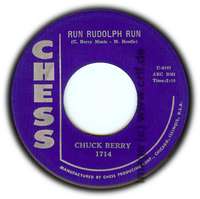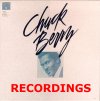 [original post published Dec. 2013 - addition May 2022]
[original post published Dec. 2013 - addition May 2022]
It's Christmas time and while listening to the radio, from time to time you'll hear one of the various cover versions of Berry's
Run Rudolph Run.
Berry's???
While everyone will tell you that this is a typical Chuck Berry song with a typical Berry melody (later re-used at the same session for Little Queenie) and typical Berry lyrics (Said Santa to a boy child, "What have you been longing for?" — "All I want for Christmas is a Rock and Roll electric guitar!"), all over the Internet you will read that this song was written by Johnny Marks and Marvin Broadie! And this includes
Wikipedia …
With the help of three fellow Berry experts,
biographer Bruce Pegg,
discographer Morten Reff, and
sessionographer Fred Rothwell, I've tried to sort out a few facts from the rumors.
In 1939 Robert L. May wrote the story of Rudolph, the red-nosed reindeer, first for his daughter Barbara, later as a giveaway booklet for his employer, the Montgomery Ward Company. Ward's was the first owner of the Rudolph copyright. In 1946 the copyright was transferred back to May and today belongs to The Rudolph Company, L.P., that means May's heirs.
In 1949 Johnny Marks, husband of May's sister Margaret and both a songwriter and radio producer, took the tale and created the famous Christmas song
Rudolph, the Red-Nosed Reindeer. The singing cowboy Gene Autry seems to be the first who recorded the song (though some sources name Harry Brannon) and made it a huge hit. Copyright to the 1949 Rudolph song is owned by Marks own publishing company called St. Nicholas Music, Inc.
In 1958, Chuck Berry recorded his version of a Christmas story named
Run Rudolph Run. The original Chess release 1714 came with this authors line:
(C. Berry Music — M. Brodie) / ARC BMI
Chuck Berry Music, Inc., Berry's company, is listed here as the author as it is on most Chess singles starting with
Beautiful Delilah up to
Ramona Say Yes. For some reasons, probably financial, it seems to have made sense to use a company name here instead of an individual's name. As the melody is pure Chuck Berry, it's no wonder that Chuck Berry Music, Inc. claimed authorship and that ARC, the Chess/Goodman publishing company, claimed copyright.

But, mystery #1:
Who is "M. Brodie"? Chuck Berry using a co-writer? A person named M. Brodie does not exist on the Internet. Not as a songwriter nor in any relation to a record company. So if M. Brodie was a songwriter,
Run Rudolph Run is his or her only published work. But M. Brodie might also have been someone Berry or the Chess Brothers wanted to give a favor (money/fame) – as they did with Alan Freed on the original
Maybellene record. Or M. Brodie might be just a pen name such as "E. Anderson" on
Let It Rock who was Berry in disguise.
In the
ASCAP authors database, the co-writer of
Run Rudolph Run named M. Brodie is identified as member number 268788988. While it's strange that
Run Rudolph Run even exists in the ASCAP database because the original single clearly refers to the rival songwriter organization BMI, it becomes even more strange:
Member number 268788988 has additional entries for songs he wrote or co-wrote. All these additional songs stem from albums recorded by a late 1990s group called the
Soultans of which a Marvin Lee Broadie was lead singer. And Marvin Lee Broadie indeed wrote some Soultans songs such as
Cross My Heart on their
Love, Sweat and Tears album. But if you look at Broadie's photo on his
concert management site, I strongly doubt he was even born when Berry's Rudolph hit the record stores. Or, as Bruce Pegg puts it:
So unless this songwriter wrote one song in 1958, then had 40 years of writers block only to surface again as a writer for a German pop band at the end of the 90s, this Mr. Broadie is not our man.
And don't overlook the different spelling of M. Brodie and Marvin Broadie.
So let's go to mystery #2:
Up to today on all Chess records or re-releases Berry's recording is always credited to Berry/Brodie or just Berry, this includes the latest HIP-O-Select boxes. In contrast, the ASCAP database and almost all cover versions name the songwriters as Johnny Marks and Marvin Broadie. Marvin Broadie aside, what has Johnny Marks to do with the Berry song?
Wikipedia claims that Marks indeed wrote the song, though Wikipedia fails to give a source for this claim. Is it likely that Marks wrote the Berry tune? Not if you compare
Run Rudolph Run to Autry's hit record. But if you knew that in 1958 Marks wrote Brenda Lee's
Rockin' Around the Christmas Tree, that story might not be too far away. Our mysterious M. Brodie could be an alias for Johnny Marks, which allowed him (an ASCAP songwriter) to team up with Berry (a BMI songwriter). However, while this is possible, I don't believe it.
More likely is a different, more logical link to Marks. His publishing company St. Nicholas Music, Inc. is very strict about copyrights. And in fact the company was created by Marks just because of the Rudolph song and to cash on its success. As such it has "exploited the name and likeness of Rudolph via trademarks in connection with a wide variety of products and services, such as musical performances, audio recordings, sheet music and other music publications" (quoted from court papers). So Marks may have forced Arc Music/Chess Records to register the song with ASCAP and under the Marks/Brodie name. St. Nicholas Music, Inc. along with Character Arts, LLC (which owns the rights to the Rudolph 1964 TV special) successfully forbids Rudolph to appear in movies unless you pay for a license. And they certainly forbid Rudolph to appear in songs as well.
I'm really glad that my rights to the Rudolph name are older than theirs. Otherwise I might have feared their lawyers for using it.
The mysteries remain. I am 100 per cent sure that the mysterious M. Brodie never heard himself called Marvin. This dual use of the 268788988 member number in the ASCAP database is certainly an error introduced by trying to remove variant spellings for the same writer. This is where M. Brodie was mixed up with Marvin Lee Broadie. Johnny Marks' entry to the game was most certainly due to legal reasons. I strongly doubt Marks' contribution to the song, but if you can put some light into this darkness, let me know.
[Addition 31-01-2022:]
Someone sent me a copy of a Facebook post by Daryl Davis, who played piano behind Chuck Berry in later years. Unfortunately I don't have a link or date to share.
Daryl reports on a discussion between him and Berry in preparation for a New Year's Eve show at B.B.King's in NYC:
I asked him about why Run Run Rudolph a/k/a Run Rudolph Run was often credited to Johnny Marks and somebody named Brodie. He said that he wrote the song himself but the name "Rudolph" had been trademarked and the publishing company publishing his songs had been sued for his using it. He was perturbed that the publishing company didn't fight the suit more vigorously, because Johnny Marks had nothing to do with his song and now he had to share the copyright. He also said that Brodie did not exist and it was a scheme to make more money for Marks and his publisher. He regretted not pursing it more at the time. But he still continued to make a lot of money from the song, just not as much as he was entitled to make. It was a bittersweet song for him.
[Addition 07-05-2022:]
In today's news there was some reporting about limitations to fair use of fictional characters in local copyright laws, in this case German Urheberrecht. A very well-known song in Europe is the title song to the 1969 TV series Pippi Longstocking. The original Swedish lyrics were written by Astrid Lindgren herself (melody by Jan Johansson). The German lyrics were written by Wolfgang Franke. 60 years after Lindgren's initial complaints about not getting compensation for use of her fictional character in Franke's text, copyright court rulings and a final settlement between the heirs explained that at least following these local laws you're not free to use the name and properties of a fictional character without sharing the income. Following this, at least here in Germany Robert May was entitled to shared copyright on the Rudolph lyrics.

